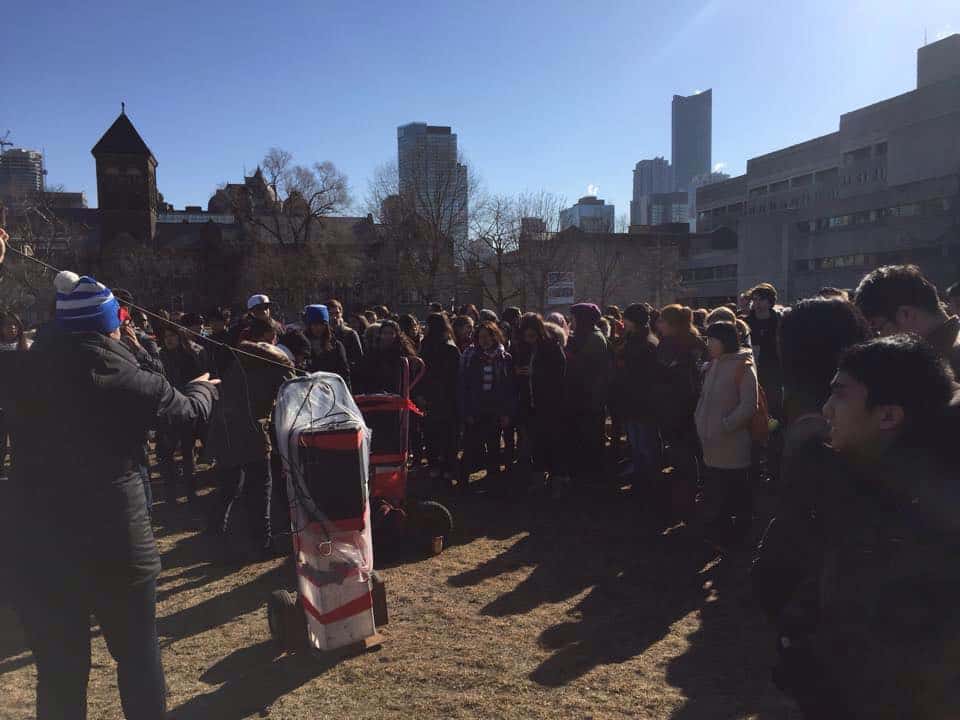PSY 100 professor Dan Dolderman relocated his class to Front Campus earlier today in response to CUPE 3902 Unit 1 members picketing outside entrances to Simcoe Hall and Convocation Hall.
The first-year class is usually held in Convocation Hall.
An engineering class scheduled for 9am was also cancelled by that course’s instructor, Mark Kortschot.
Abe Singer, a member of the CUPE 3902 Unit 1 strike committee and one of the organizers of the picketing outside the two buildings, said he was unsure whether Convocation Hall had been closed off to students.
“They’ve been locking and unlocking the doors… People have been coming in and out,” said Singer.
Campus police guarded the entrances to Simcoe Hall. According to one officer, Simcoe Hall was closed to everyone except those with key access, but Convocation Hall was open. The officer said that the decisions to cancel and relocate the classes, respectively, were made by the course instructors.
Michael Kurts, U of T assistant vice-president, strategic communications & marketing, said that campus police did not lock the doors to Convocation Hall.
According to a student from the earlier engineering class, APS 112 was cancelled by Kortschot as not many students were present for the lecture. The student says that some students could not go around the picket lines at the entrance, while other students were delayed because of the suspension of subway service on the Yonge-University line.
Kortschot declined to comment on the cancellation.
Speaking to the Varsity after his class, Dolderman said that his decision to relocate the PSY 100 class was not a political choice, but rather born out of the logistics of the situation.
“It didn’t seem feasible that we were going to have the class. It also didn’t seem right to completely turn all the students away who had showed up to have a conversation about mental illness in the class. So it seemed like having a voluntary discussion in the field was the best compromise between the different needs of the moment,” he said.
“Ultimately, for me, if there is a group of people that are mobilizing themselves against a system they feel disempowered by, it’s worth respecting that – just as an overall principle,” he said about the picket line.
Dolderman also took note of his responsibility to his students. “Walking into the course, I also have a responsibility. There’s a thousand students coming to talk about mental illness today in my class,” he said.
“So from the perspective of the undergraduates’ education and personal learning experience, I would want to have my class today. From the perspective of the picket line, I can respect that. And from the logistics of the situation, I couldn’t get all those people easily into the class anyways,” he added.
Dolderman said he had arrived for class straight from a doctor’s appointment and was caught off guard by the situation in front of Convocation Hall. He described it as “a very difficult to navigate situation,” saying that he “truly didn’t know what the right thing to do was.”
“Someone said the doors had been locked by the administration, someone told me that the picket line would open if we still wanted students to come in… and someone told me that the classes had been cancelled because a previous class had been cancelled. Basically, I heard all kinds of conflicting things when I was there and I just had to make a decision,” he said.
Given the constraints under which he made his decision to relocate, Dolderman said he does not want his “idiosyncratic decision about this class to be taken as a political decision, one way or the other.”
“I know ultimately everything is a political statement, but for me it was a personal decision based on conflicting responsibilities,” he said. “I’m in the position — as the professor of a class — to balance various perspectives and I ultimately have to make a decision… so you do the best you can.”


